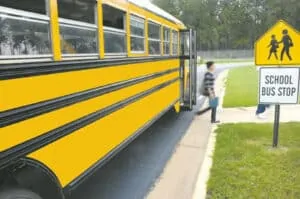Workers’ Compensation for Schools / Education Industry
 The most common way for schools to address their work comp insurance needs is to form governmental pools.
The most common way for schools to address their work comp insurance needs is to form governmental pools.
- This is where schools join together to self-insure their workers’ compensation exposures.
- Governmental pools can be groups of schools in a local area, or the entire state
- There are also insurance carriers who will write the coverage for schools, school districts and privately owned educational services.
The workforce is a mixture of occupations, including:
- Teachers
- Administration
- Cafeteria workers
- Bus drivers
- Janitorial staff
Overall, the exposure to injuries is lower than businesses in general and the frequency of injury is lower. The severity of injuries however is closer to the median because cafeteria workers, bus drivers and janitorial workers incur musculoskeletal injuries at a higher than average rate.
Most schools have a safety program to prevent routine accidents.
- The schools are normally designed to be safe environments for the students and staff.
- Injuries that occur most frequentlyare due to:
- Trip and falls
- Strains from improper lifting
- School bus related accidents
Medical care is often provided on-site for minor injuries by the school nurse.
- When more serious injuries occur, medical care is normally available nearby.
- Selection of medical providers will depend upon the state where the injury occurs.
The overall cost of temporary total indemnity benefits is approximately the same as the average for all occupations.
- Permanent partial disability benefits occur infrequently.
- Disabilities from repetitive motion injuries are lower than most industries.
Some categories related to schools that would have the same or similar work comp issues include:
- Daycare centers
- Educational testing services
- Specialty training — schools for the blind, schools for the deaf
- Technical schools:
- GED and other adult education centers
- Trade schools
Transitional / Modified Duties in Schools
Accommodation for restricted employees of schools is generally possible. Most of the jobs are sedentary to light/medium nature in terms of physical requirements. If there is an applicable union contract, be sure to review the terms to verify modified duty is not prohibited or restricted. Accommodation examples include:
| Teacher: | Allow a chair or stool if restricted from standing. Ask another employee or an aid to carry heavy books, equipment or a computer as needed on a temporary basis. |
| Cafeteria Worker: | Allow temporary placement as a lunchroom attendant if unable to work in the kitchen. Identify tasks of other jobs the employee can perform. |
| Janitor: | Allow lighter cleaning duties on a temporary basis. |



 Sports Teams
Sports Teams
